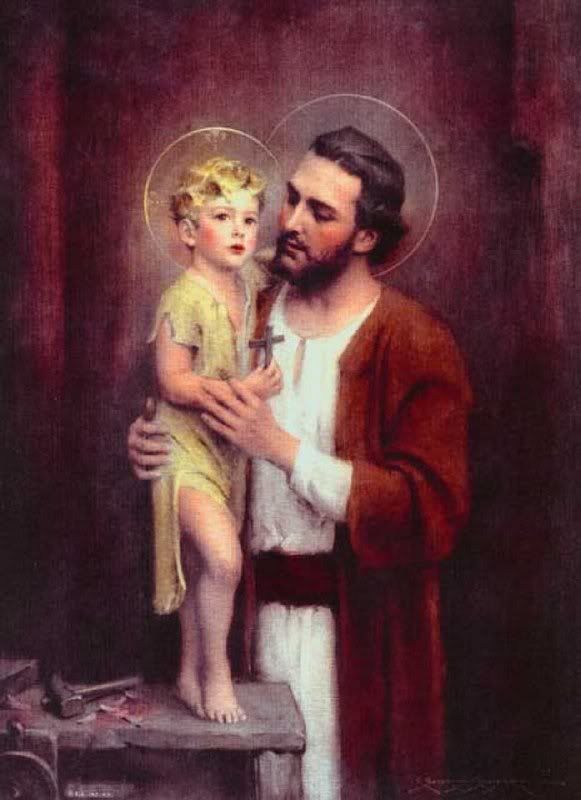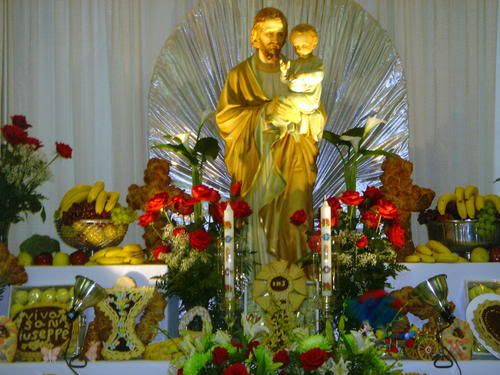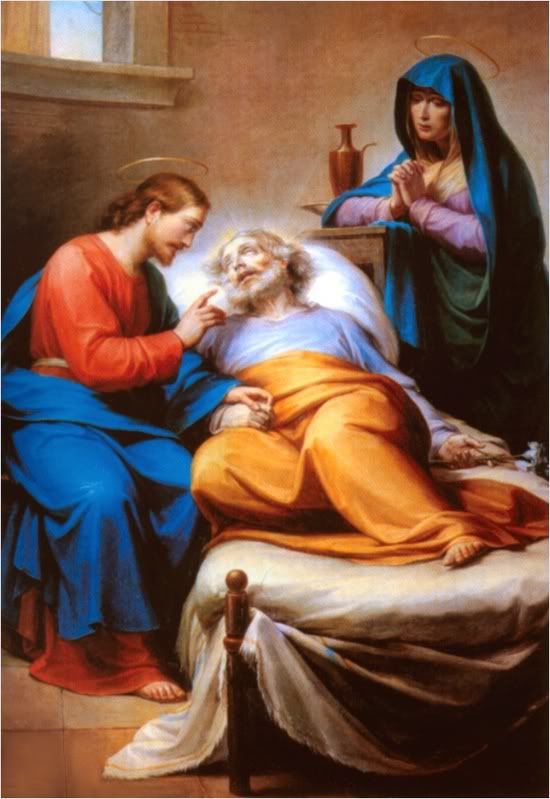Saturday, March 24, 2012
Saturday Of the Fourth Week In Lent

Stational Church:
S. Nicola in Carcere
From The Passion And Death Of Jesus Christ, by Saint Alphonsus de Liguori:
O my Jesus, and art not Thou, then, true king of the universe ? And how is it that Thou art now become king of sorrow and reproach ? See whither love has brought Thee ! O my most lovely God, when will that day arrive whereon I may so unite myself to Thee, that nothing may evermore have power to separate me from Thee, and I may no longer be able to cease to love Thee! O Lord, as long as I live in this world, I always stand in danger of turning my back upon Thee, and of refusing to Thee my love, as I have unhappily done in time past.
0 my Jesus, if Thou foreseest that by continuing in life I should have to suffer this greatest of all misfortunes, let me die at this moment, while I hope that I am in Thy grace ! I pray Thee, by Thy Passion, not to abandon me to so great an evil. I should indeed deserve it for my sins; but Thou dost deserve it not. Choose out any punishment for me rather than this. No, my Jesus, my Jesus, I would not see myself ever again separated from Thee.
Amen.
Devotions for a Lenten Saturday holy hour:
Divine Mercy Chaplet
Seven Penitential Psalms
Prayer of St. Thomas More
Threnus Prayer of Saint Augustine
Stabat Mater Dolorosa
Litany of Our Lady of Sorrows
Sorrowful Mysteries
Labels: Lent
Friday, March 23, 2012
Friday Of the Fourth Week In Lent

Station Church:
S. Eusebio all'Esquilino
From The Passion And Death Of Jesus Christ, by Saint Alphonsus de Liguori:
O my Jesus ! how do I behold Thee weighed down with sorrow and sadness ! Ah, too much reason hast Thou to think that while Thou dost suffer even to die of anguish upon this wood, there are yet so few souls that have the heart to love Thee ! O my God! how many hearts are there at the present moment, even among those that are consecrated to Thee, who either love Thee not, or love Thee not enough ! O beautiful flame of love, thou that didst consume the life of a God upon the cross, oh, consume me too; consume all the disorderly affections which live in my heart, and make me live burning and sighing only for that loving Lord of mine, who, for love of me, was willing to end his life, consumed by torments, upon a gibbet of ignominy ! O my beloved Jesus! I wish ever to love Thee, and Thee alone, alone ; my only wish is to love my love, my God, my all.
Devotions for a Lenten Friday holy hour:
Dies Irae
Divine Mercy Chaplet
Seven Penitential Psalms
Prayer of St. Thomas More
Threnus Prayer of Saint Augustine
Devotions To the Holy Cross
The Stations of the Cross
Two weeks until Good Friday
Labels: Lent
Friday At the Foot Of the Cross, Lent 5

Ant.
Remember not, Lord, my offenses, nor the offenses of my fathers, nor takest Thou vengeance upon them.
Psalm 101/102
2 HEAR, O LORD, my prayer: * and let my cry come to Thee.
3 Hide not Thy face from me: in the day of my distress, * incline Thy ear to me. On the day I call upon Thee, * hear me speedily.
4 For my days have vanished like smoke, * and my bones burn like dry wood in a fire.
5 My heart is dried up and withered like grass: * and so I have forgotten to eat my bread.
6 Because of my groaning, * my bones cleave to my flesh.
7 I am like a pelican in the desert: * I am like a night owl among the ruins.
8 I kept awake, * and am like a lone sparrow on the housetop.
9 All day my enemies reviled me: * in their rage against me they made a curse of me.
10 For I eat ashes like bread, * and mingle my drink with tears.
11 Because of Thy anger and indignation: * having lifted me up, Thou hast then cast me down.
12 My days are like a lengthening shadow, * and I have withered like grass.
13 But thou, O Lord, endurest for ever: * and Thy memorial for generations and generations.
14 Thou shalt arise and have mercy on Sion, for it is time to be merciful, * for the appointed time has come.
15 For her stones have pleased Thy servants: * and her dust moves them to pity.
16 All the Gentiles shall fear Thy name, O Lord, * and all the kings of the earth Thy glory.
17 For the Lord hath built up Sion: * and He shall be seen in His glory.
18 He hath regarded the prayer of the humble: * and he hath not despised their prayer.
19 Let these things be written for the next generation: * and the people that shall be created will praise the Lord:
20 For he hath looked down from his sanctuary on high: * from heaven the Lord hath looked upon the earth.
21 that he might hear the groans of those imprisoned * that he might release the children of the dead:
22 That they may declare the name of the Lord in Sion: * and His praise in Jerusalem;
23 when the people assemble together, * and kings, that they may serve the Lord.
24 He hath broken my strength in the way, * He hath cut short my days.
25 I shall say: "My God take me not away in the midst of my days: * Thy years are for generations and generations.
26 In the beginning, O Lord, Thou foundedst the earth: * and the heavens are the works of thy hands.
27 They shall perish but Thou shalt remain: * and all of them shall grow old like a garment:
And like clothing Thou shalt change them, and they shall be changed. * 28 But Thou art always the same, and Thy years have no end.
29 The children of Thy servants shall abide * and their offspring shall be established in Thy presence."
GLORY be to the Father, and to the Son, and to the Holy Ghost, as it was in the beginning, is now, and will be forever. Amen.
Prayer Against Gluttony
O wretched me, who hath forsaken Thee, Lord God, the font of living water. I have dug myself cisterns of earthly delights, broken cisterns, that can hold no living water! (cf Jer 2:13) Verily have I forgotten to eat my bread, the bread of life, having in it all delight and sweetness of taste. Instead I was eager to fill my belly with the husks pigs eat. (Lk 15:16) As yet food was in the mouth of the Sons of Israel, when God's anger descended upon them: and is so often spared me, who thru intemperance of food and drink has been formed in the likeness of a beast and not in Thy image, O God. O how in the end might I eat ashes like bread and mingle tears with my drink. May my food be to do Thy will in everything, Thou who shalt make us drink from the river of Thy delights. (Ps 35:9)
Ant.
Remember not, Lord, my offenses, nor the offenses of my fathers, nor takest Thou vengeance upon them.
Labels: Friday At the Foot Of the Cross
Thursday, March 22, 2012
Thursday Of the Fourth Week In Lent

Station Church:
Ss. Silvestro e Martino ai Monti
From The Passion And Death Of Jesus Christ, by Saint Alphonsus de Liguori:
O my crucified Jesus ! to make Thyself loved by men Thou has spared nothing; Thou hast even given Thy life with a most painful death; how, then, can men who love their kindred, their friends, and even animals from whom they receive any token of affection, be so ungrateful to Thee as to despise Thy grace and Thy love, for the sake of miserable and vain delights ! Oh, miserable that I am, I am one of those ungrateful beings who, for things of no worth, have renounced Thy friendship, and have turned my back upon Thee. I have deserved that Thou shouldst drive me from Thy face, as I have often banished Thee from my heart. But I know that Thou dost not cease to ask my heart of me : Thou shalt love the Lord thy God.1 Yea, O my Jesus, as Thou desirest that I should love Thee and offerest me pardon, I renounce all creatures, and henceforth I desire to love Thee alone, my Creator and my Redeemer. Thou dost deserve to be the only object of my soul's love.
O Mary, Mother of God, and refuge of sinners, pray for me; obtain for me the grace of loving God, and I ask for nothing more.
Devotions for a Lenten Thursday Holy Hour:
Dies Irae
Divine Mercy Chaplet
Seven Penitential Psalms
Prayer of St. Thomas More
Threnus Prayer of Saint Augustine
Devotion To the Holy Face
Labels: Lent
Wednesday, March 21, 2012
Saint Benedict

The Golden Legend on the father of Western monasticism.
The Holy Father has had 2 patronal days in the last 3! St. Joseph on Saturday and St. Benedict today.
Saint Benedict of Nursia, please pray for us!
Labels: Our Saintly Brethern
Wednesday Of the Fourth Week In Lent

Station Church:
St. Paul Outside the Walls
From The Passion and Death Of Jesus Christ, by Saint Alphonsus de Liguori:
O my Jesus, innocent Lamb, these barbarians shear Thee, not of wool, but of Thy skin and flesh. But behold the baptism of blood which Thou didst so ardently desire when Thou didst say, "I have a baptism wherewith I am to be baptized; and how I am straightened until it be accomplished". Go, my soul, and wash thyself in the precious blood with which the fortunate floor is bathed. And O my sweet Saviour, how can I any longer doubt of Thy love, when I see Thee wounded and manged for my sake? I know that every wound in Thy body is a most certain testimony of the affection Thou hast for me. I hear every wound demanding my love. A single drop of Thy blood was sufficient to save me: but Thou dost wish to give me the entire of it without reserve, that I might give myself to thee entirely and without reserve. Yes, my Jesus, I give my whole being to Thee without any reserve; assist me and help me to be faithful to Thee.
Amen.
Devotions for a Lenten Wednesday holy hour:
Dies Irae
Divine Mercy Chaplet
Seven Penitential Psalms & the prayers against the Seven Deadly Sins
Prayer of St. Thomas More
Threnus Prayer
Seven Prayers of St. Gregory
Labels: Lent
Tuesday, March 20, 2012
Tuesday Of the Fourth Week In Lent

Station Church:
S. Lorenzo in Damaso
From The Passion And Death Of Jesus Christ, by Saint Alphonsus de Liguori:
Behold, then, O my lacerated Lord, the condition to which our iniquities have reduced Thee: "O Good Jesus, it is ourselves who sinned; and dost Thou bear the penalty of it?" Blessed forevermore be Thy exceeding charity; and mayest Thou be beloved as Thou dost deserve by all sinners; and above all by me, who hast done Thee more despite than others.
Amen.
Labels: Lent
Saint Cuthbert

Read about this great English saint, around whom the Cathedral of Durham was based.
Saint Cuthbert, please pray for us!
Labels: Our Saintly Brethern
Monday, March 19, 2012
Monday Of the Fourth Week In Lent

Station Church:
Ss. Quattro Coronati al Celio
From The Passion And Death Of Jesus Christ, by Saint Alphonsus de Liguori:
Blessed forever be Thy mercy, O my Jesus, who didst voluntarily submit to torments in order to deliver me from eternal torments. O! Miserable and unhappy is the soul that loves not Thee, O God of love!
Amen.
Devotions for a Lenten Monday holy hour:
Dies Irae
Divine Mercy Chaplet
Seven Penitential Psalms
Prayer of St. Thomas More
Threnus Prayer of Saint Augustine
Devotion of the Five Sacred Wounds
Labels: Lent
The Feast Of Saint Joseph

Litany of Saint Joseph
Lord, have mercy on us.
Christ, have mercy on us.
Lord, have mercy on us.
Christ, hear us.
Christ, graciously hear us.
God, the Father of Heaven,
Have mercy on us.
God the Son, Redeemer of the world,
Have mercy on us.
God the Holy Ghost,
Have mercy on us.
Holy Trinity, one God,
Have mercy on us.
Holy Mary,
Pray for us.
Holy Joseph,
Pray for us.
Noble Son of the House of David,
Pray for us.
Light of the Patriarchs,
Pray for us.
Husband of the Mother of God,
Pray for us.
Chaste Guardian of the Virgin,
Pray for us.
Foster-father of the Son of God,
Pray for us.
Sedulous Defender of Christ,
Pray for us.
Head of the Holy Family,
Pray for us.
Joseph most just,
Pray for us.
Joseph most chaste,
Pray for us.
Joseph most prudent,
Pray for us.
Joseph most valiant,
Pray for us.
Joseph most obedient,
Pray for us.
Joseph most faithful,
Pray for us.
Mirror of patience,
Pray for us.
Lover of poverty,
Pray for us.
Model of all who labor,
Pray for us.
Glory of family life,
Pray for us.
Protector of Virgins,
Pray for us.
Pillar of families,
Pray for us.
Consolation of the afflicted,
Pray for us.
Hope of the sick,
Pray for us.
Patron of the dying,
Pray for us.
Terror of the demons,
Pray for us.
Protector of the holy Church,
Pray for us.
Lamb of God, Who takest away the sins of the world,
have mercy on us.
Lamb of God, Who takest away the sins of the world,
have mercy on us.
Lamb of God, Who takest away the sins of the world,
have mercy on us.
V. He made him master of his house,
R. And ruler of all his possesions.
Let us pray:
O God, Thou wert pleased to choose Saint Joseph as the husband of Mary and the guardian of Thy Son. Grant that, as we venerate him as our protector on earth, we may deserve to have him as our intercessor in heaven. We ask this through Christ our Lord.
Amen.

The Extensive Patronage of Saint Joseph

Zeppole di San Guiseppe
Or you can stop in at Maria's Pastry Shop, on Cross Street in Boston's North End for some, if you don't feel like making the pastry yourself.
Or you could just have some Sloppy Joes, I suppose.

The Sicilian Custom of St. Joseph's Day Altars
And do not forget St. Joseph's vital role as patron of a happy death. Many saints are associated with the deathbed. St. Peter with his binding and loosing powers is popularly said to be the gatekeeper of Heaven. St. Michael has been said to be the escort of the newly departed soul, and the one who protects it from the demons waiting by the deathbed to snatch the soul and drag it to Hell. Our Blessed Lady is, of course, vital here, too (don't forget your daily Three Aves for a Happy and Holy Death). But St. Joseph is a principal patron of the deathbed. Why? Just think: he died in the arms of Jesus and Mary. Who has ever had a happier death than he?

Labels: Our Saintly Brethern
Sunday, March 18, 2012
Laetare Sunday Or the Fourth Sunday Of Lent

Station Church:
S. Croce in Gerusalemme
As we come to this little easing of Lenten severity, which lasts from Laetare Sunday through Lady Day on the 25th, with the feasts of Saint Patrick and Saint Joseph in between, paradoxically, I am coming to the "heavy trucking" in my daily illustrations of Our Lord's Passion. Can't be helped.
From The Passion And Death Of Jesus Christ, by Saint Alphonsus de Liguori:
Behold me, O my Jesus! I am one of Thy most cruel executioners, who have scourged Thede with my sins. Have pity on me! O my loving Saviour, a heart is too little with which to love Thee. I desire no longer to live for myself. I desire to live only for Thee, my love, my all. Wherefore, I say to Thee with Saint Catharine of Genoa, "O Love! O Love! Let there be no more sins. It is enough that I have already offended Thee so much! Now I hope to be wholly Thine, and with Thy grace, I desire to be ever Thine through all eternity."
Amen.
Devotions for a Lenten Sunday Holy Hour:
Divine Mercy Chaplet
Seven Penitential Psalms
Prayer of St. Thomas More
Psalter of St. Jerome
Threnus Prayer of St. Augustine
From The Liturgical Year, by Abbot Prosper Gueranger, OSB:
This Sunday, called, from the first word of the Introit, Laetare Sunday, is one of the most solemn of the year. The Church interrupts her lenten mournfulness; the chants of the Mass speak of nothing but joy and consolation; the organ, which has been silent during the preceding three Sundays, now gives forth its melodious voice; the deacon resumes his dalmatic, and the subdeacon his tunic; and instead of purple, rose-coloured vestments are allowed to be used. These same rites were practised in Advent, on the third Sunday, called Gaudete. The Church's motive for introducing this expression of joy into to-day's liturgy is to encourage her children to persevere fervently to the end of this holy season. The real mid-Lent was last Thursday, as we have already observed; but the Church, fearing lest the joy might lead to some infringement on the spirit of penance, has deferred her own notice of it to this Sunday, when she not only permits, but even bids, her children to rejoice!
The Station at Rome is in the basilica of Holy Cross in Jerusalem, one of the seven principal churches of the holy city. It was built in the fourth century, by the emperor Constantine, in one of his villas called Sessorius, on which account it goes also under the name of the Sessorian basilica. The emperor's mother, St. Helen, enriched it with most precious relics, and wished to make it the Jerusalem of Rome. With this intention she ordered a great quantity of earth taken from Mount Calvary to be put on the site. Among the other relics of the instruments of the Passion which she gave to this church was the inscription which was fastened to the cross; it is still there, and is called the Title of the Cross. The name of Jerusalem, which has been given to this basilica, and which recalls to our minds the heavenly Jerusalem towards which we are tending, suggested the choice of it as to-day's Station. Up to the fourteenth century, when Avignon became for a time the city of the Popes, the ceremony of the golden rose took place in this church; at present, it is blessed in the palace where the sovereign Pontiff happens to be residing at this season.
The blessing of the golden rose is one of the ceremonies peculiar to the fourth Sunday of Lent, which is called on this account Rose Sunday. The thoughts suggested by this flower harmonize with the sentiments wherewith the Church would now inspire her children. The joyous time of Easter is soon to give them a spiritual spring, of which that of nature is but a feeble image. Hence, we cannot be surprised that the institution of this ceremony is of a very ancient date. We find it observed under the pontificate of St. Leo IX. (eleventh century); and we have a sermon on the golden rose preached by the glorious Pope Innocent III., on this Sunday, and in the basilica of Holy Cross in Jerusalem. In the middle ages, when the Pope resided in the Lateran palace, having first blessed the rose, he went on horseback to the church of the Station. He wore the mitre, was accompanied by all the Cardinals, and held the blessed flower in his hand. Having reached the basilica, he made a discourse on the mysteries symbolized by the beauty, the colour, and the fragrance of the rose. Mass was then celebrated. After the Mass, the Pope returned to tile Lateran palace. Surrounded by the sacred college, he rode across the immense plain which separates the two basilicas, with the mystic flower still in his hand. We may imagine the joy of the people as they gazed upon the holy symbol. When the procession had reached the palace gates, if there were a prince present, it was his privilege to hold the stirrup, and assist the Pontiff to dismount; for which filial courtesy he received the rose, which had received so much honour and caused such joy.
At present, the ceremony is not quite so solemn; still the principal rites are observed. The Pope blesses the golden rose in the vestiary; he anoints it with holy chrism, over which he sprinkles a scented powder, as formerly; and when the hour for Mass has come, he goes to the palace chapel, holding the flower in his hand. During the holy Sacrifice, it is fastened to a golden rose-branch prepared for it on the altar. After the Mass, it is brought to the Pontiff, who holds it in his hand as he returns from the chapel to the vestiary. It is usual for the Pope to send the rose to some prince or princess, as a mark of honour; sometimes, it is a city or a Church that receives the flower.
We subjoin a free translation of the beautiful prayer used by the sovereign Pontiff when blessing the golden rose. It will give our readers a clearer appreciation of this ceremony, which adds so much solemnity to the fourth Sunday of Lent. 'O God! by whose word and power all things were created, and by whose will they are all governed! O Thou that art the joy and gladness of all Thy faithful people! we beseech Thy divine Majesty, that Thou vouchsafe to bless and sanctify this rose, so lovely in its beauty and fragrance. We are to bear it, this day, in our hands, as a symbol of spiritual joy; that thus the people that is devoted to Thy service, being set free from the captivity of Babylon by the grace of Thine only-begotten Son who is the glory and the joy of Israel, may show forth, with a sincere heart, the joys of that Jerusalem, which is above, and is our mother. And whereas Thy Church, seeing this symbol, exults with joy for the glory of Thy Name; do thou, O Lord! give her true and perfect happiness. Accept her devotion, forgive us our sins, increase our faith; heal us by Thy word, protect us by Thy mercy; remove all obstacles; grant us all blessings; that thus this same Thy Church may offer unto Thee the fruit of good works; and walking in the odour of the fragrance of that Flower, which sprang from the root of Jesse, and is called the Flower of the field, and the Lily of the valley, may she deserve to enjoy an endless joy in the bosom of heavenly glory, in the society of all the saints, together with that divine Flower, who liveth and reigneth with Thee in the unity of the Holy Ghost, world without end. Amen.'
We now come to the explanation of another name given tot the fourth Sunday of Lent, which was suggested by the Gospel of the day. We find this Sunday called in several ancient documents, the Sunday of the five loaves. The miracle alluded to in this title not only forms an essential portion of the Church's instructions during Lent, but it is also an additional element of to-day's joy. We forget for an instant the coming Passion of the Son of God, to give our attention to the greatest of the benefits He has bestowed on us; for under the figure of these loaves multiplied by the power of Jesus, our faith sees that Bread which came down from heaven, and giveth life to the world.1 'The Pasch,' says our Evangelist, 'was near at hand'; and, in a few days, our Lord will say to us: 'With desire I have desired to eat this Pasch with you.'2 Before leaving this world to go to His Father, Jesus desires to feed the multitude that follows Him; and in order to do this, He displays His omnipotence. Well may we admire that creative power, which feeds five thousand men with five loaves and two fishes, and in such wise that even after all have partaken of the feast as much as they would, there remain fragments enough to fill twelve baskets. Such a miracle is, indeed, an evident proof of Jesus' mission; but He intends it as a preparation for something far more wonderful; He intends it as a figure and a pledge of what He is soon to do, not merely once or twice, but every day, even to the end of time; not only for five thousand men, but for the countless multitude of believers. Think of the millions, who, this very year, are to partake of the banquet of the Pasch; and yet, He whom we have seen born in Bethlehem (the house of bread) is to be the nourishment of all these guests; neither will the divine Bread fail. We are to feast as did our fathers before us; and the generations that are to follow us, shall be invited as we now are, to come and taste how sweet is the Lord.3
But observe, it is in a desert place, as we learn from St. Matthew,4 that Jesus feeds these men, who represent us Christians. They have quitted the bustle and noise of cities in order to follow Him. So anxious are they to hear His words, that they fear neither hunger nor fatigue; and their courage is rewarded. A like recompense will crown our labours, our fasting and abstinence, which are now more than half over. Let us, then, rejoice, and spend this day with the light-heartedness of pilgrims who are near the end of their journey. The happy moment is advancing, when our soul, united and filled with her God, will look back with pleasure on the fatigues of the body, which, together with our heart's compunction, have merited for her a place at the divine banquet.
The primitive Church proposed this miracle of the multiplication of the loaves as a symbol of the Eucharist, the Bread that never fails. We find it frequently represented in the paintings of the catacombs and on the bas-reliefs of the ancient Christian tombs. The fishes, too, that were given together with the loaves, are represented on these venerable monuments of our faith; for the early Christians considered the fish to be the symbol of Christ, because the word 'fish' in Greek is made up of five letters, which are the initials of these words: Jesus Christ, Son (of) God, Saviour.
In the Greek Church this is the last day of the week called, as we have already noticed, Mesonestios. Breaking through her rule of never admitting a saint's feast during Lent, she keeps this mid-Lent Sunday in honour of the celebrated abbot of the monastery of Mount Sinai, St. John Climacus, who lived in the sixth century.
Labels: Lent, The Liturgical Year






































































































